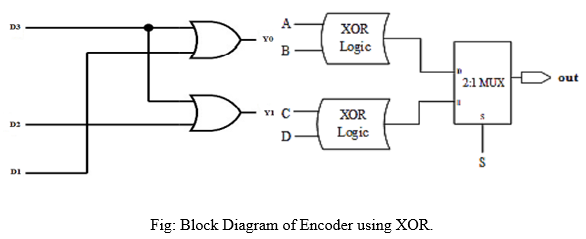A Cost-Efficient QCA XOR-XNOR Topology for Nanotechnology Applications
Also Available Domains Arithmetic Core
Objective
The main aim of this paper is to implement xor xnor gates with reduced number on QCA cells in an efficient way and improve the performance of the design.
Abstract
A quantum-dot cellular automata (QCA) is an inventive Nano-level computation that suggests fewer dimensions, less power consumption, with more speed and premeditated as an amplification of the scaling obstacle. with the CMOS methodology. One of the newest and rising nanotechnologies used today This is QCA based on the repulsion of Coulomb. One of the newest and rising nanotechnologies is The QCA based on the repulsion of Coulomb is used today. Surmised computing is a successful paradigm for energy-efficient hardware design at the Nano-scale. In this project, We proposed a proficient, low-complex 2-bit & 3-bit XOR, XNOR, 2-bit An XOR/XNOR gate has been suggested in QCA technology. Next, using those proposed A 4:2 encoder and a 4:1 encoder are designed in QCA technology. The proposed The QCA XOR gate contains a very small number of quantum cells as well as areas as related to its best previous existing QCA layouts. The simulation outcomes illustrate The suggested architecture outperforms in comparison to its best existing counterpart. layouts in terms of quantum cell count, area, latency, and quantum cost.
Keywords: Quantum-dot Cellular Automata (QCA), XOR, XOR/XNOR, QCA Designer, encoder
NOTE: Without the concern of our team, please don't submit to the college. This Abstract varies based on student requirements.
Block Diagram

Specifications
Software Requirements:
· QCA designer
Hardware Requirements:
· Microsoft® Windows XP
· Intel® Pentium® 4 processor or Pentium 4 equivalent with SSE support.
· 512 MB of RAM
· 100 MB of available disk space
Learning Outcomes
- The Basics of Digital Electronics
- VLSI Design Flow
- An Introduction to Quantum Dot Cellular automata (QCA)
- Creating designs in QCA The Designer tool
- Introduction to Combinational short circuits.
- Knowledge of XOR, XNOR, and encoder.
- Applications in real time
- QCA Designer for design and simulation
- Solution providing for real time problems
- Project Development Skills:
o Problem Analysis Skills
o Problem Solving Skills
o Logical Skills
o Designing Skills
o Testing Skills
o Debugging Skills
o Presentation Skills
o Thesis Writing Skills





 Paper Publishing
Paper Publishing
